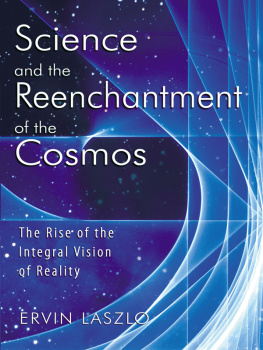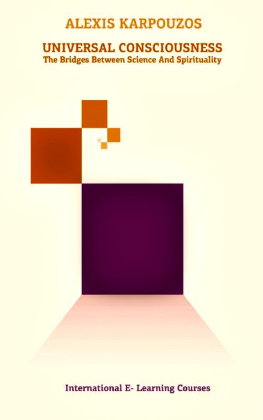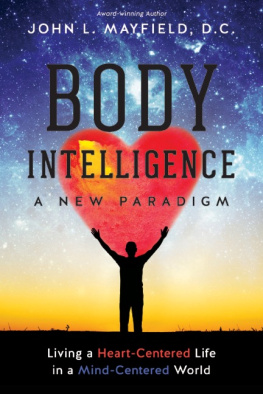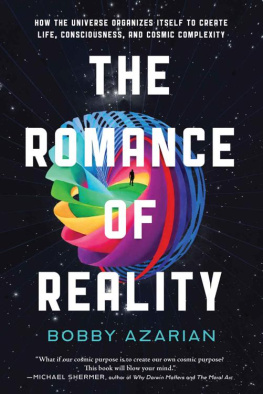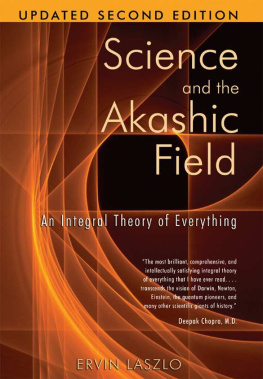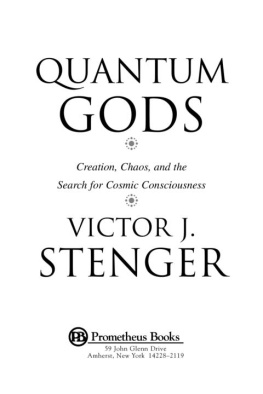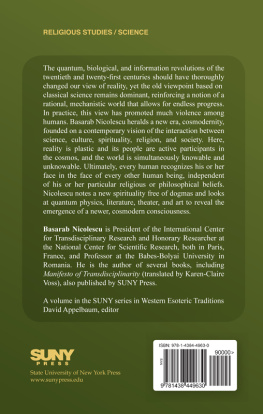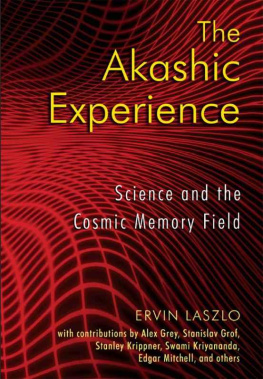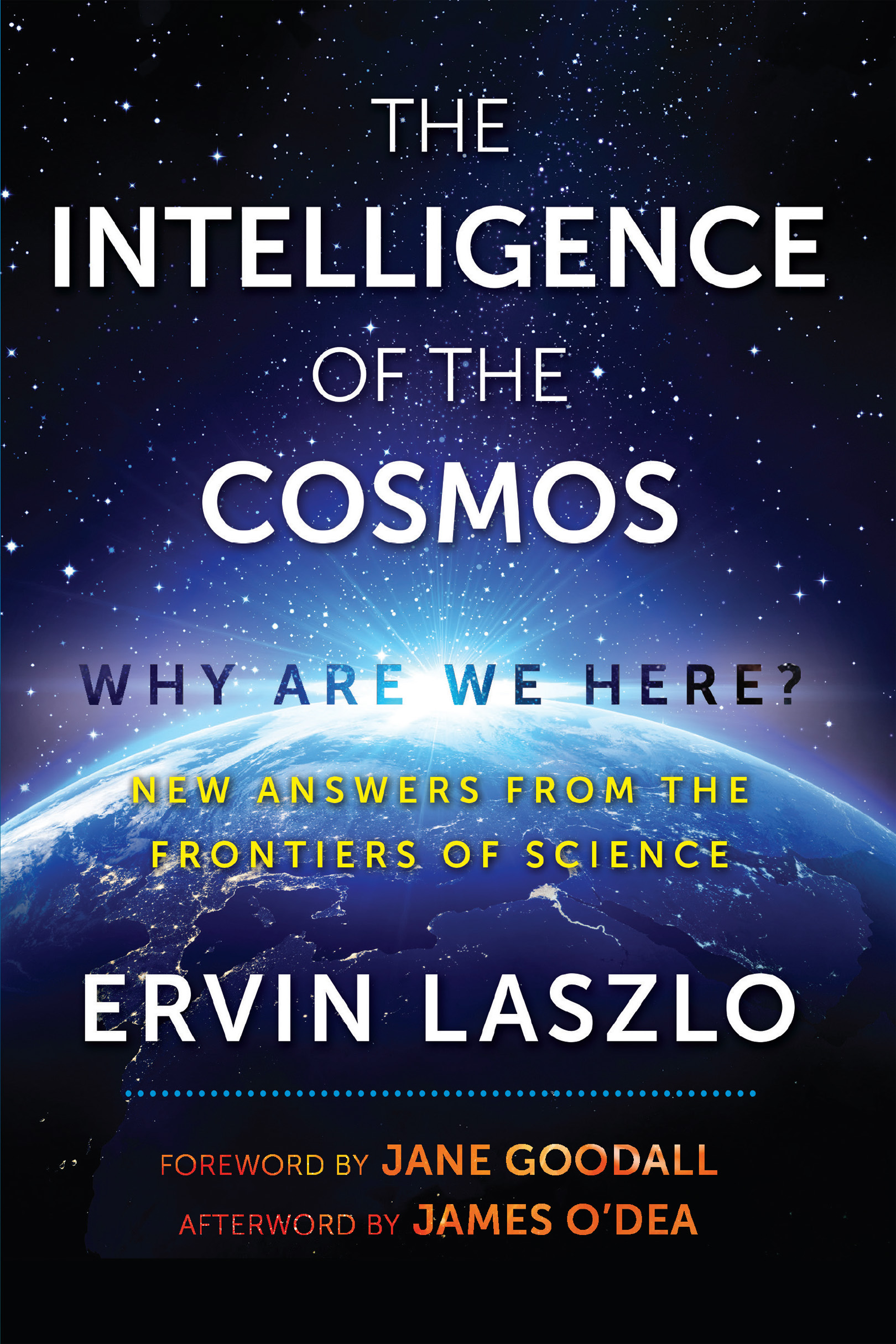
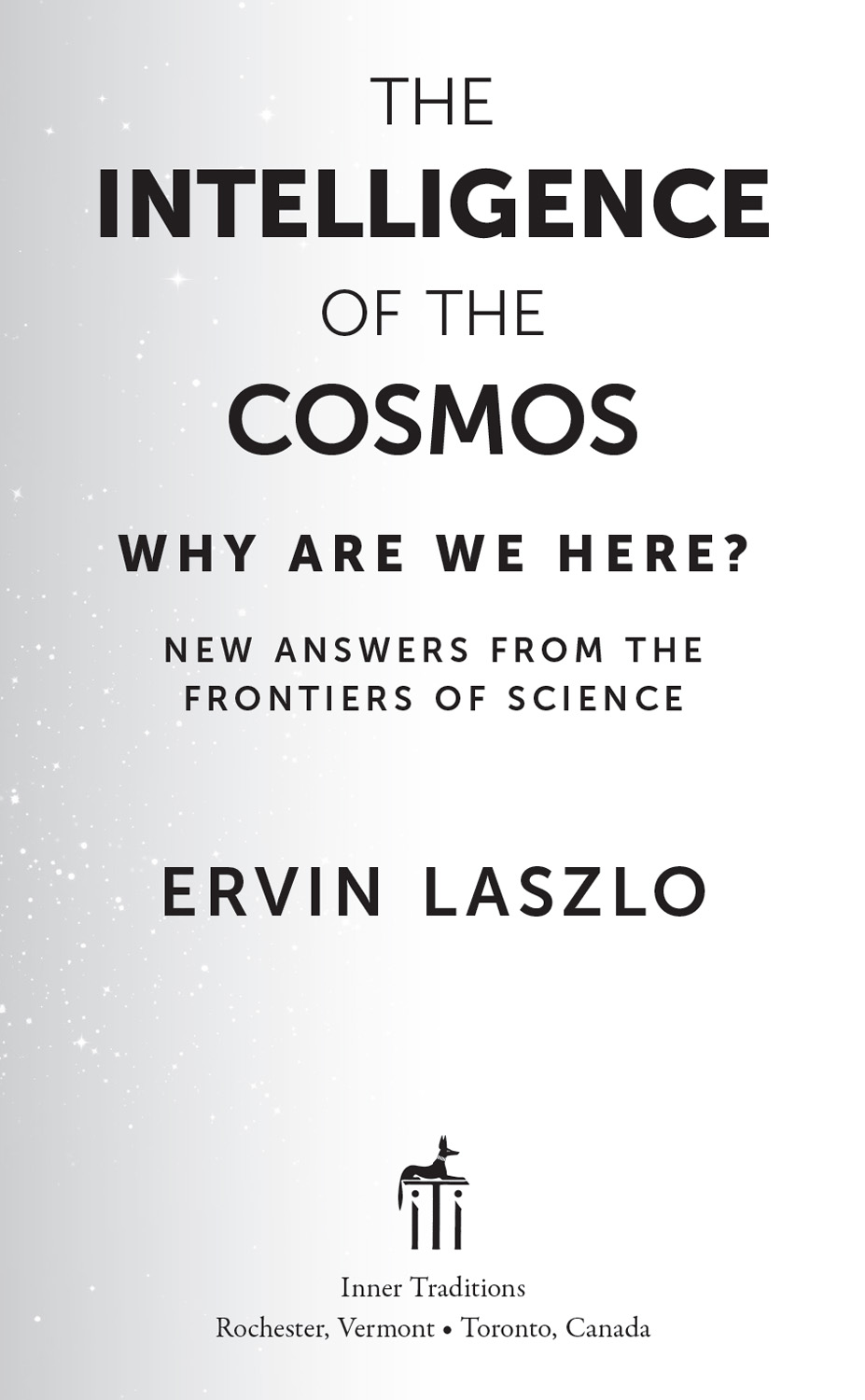
THE
INTELLIGENCE
OF THE
COSMOS

From the time when the conscious universe was a preposterous notion to today, when its a cutting-edge idea full of promise for your future, Ervin Laszlo has been its staunch champion. Now he and his colleagues press the argument with even more urgency and depth. I concur that consciousness must be regarded as the ground state of existence. Only when we begin to see ourselves embedded in a reality where mind, body, ecology, planet Earth, and the cosmos are all expressions of the same consciousness will we truly know who we are.
DEEPAK CHOPRA, COAUTHOR OF YOU ARE THE UNIVERSE
Ervin Laszlo is without any doubt one of the greatest scientists and philosophers of our time. His seminal concepts of the Akashic holofield and the connectivity hypothesis represent an extraordinary intellectual achievement that will be seen in the future as a critical landmark in the history of science. Laszlo succeeded in something previously deemed impossiblecreating a map of everything that dissolves the boundaries between natural sciences, psychology, philosophy, and spirituality. In his latest book, The Intelligence of the Cosmos, Laszlo summarizes in a clear and captivating style his profound understanding of the nature of reality and human nature that has emerged from six decades of his unrelenting search for truth. His work might become the cornerstone of the new comprehensive scientific worldview of the twenty-first century.
STANISLAV GROF, M.D., AUTHOR OF BEYOND THE BRAIN, PSYCHOLOGY OF THE FUTURE, AND THE COSMIC GAME
Professor Ervin Laszlo, author of the 1987 world-changing classic Evolution: The Grand Synthesis, again gives us a great work for the future, The Intelligence of the Cosmos: Why Are We Here? New Answers from the Frontiers of Science. For the entire past century science has inched steadily toward a synthesis of physics, cosmology, and biology. Increasingly cosmology looks more and more like evolutionary biology, and intelligence is discovered in the tiniest nooks and crannies of the universe. Now comes the bold step in which Laszlo points out the obvious, showing us that the universe is a living intelligent being. This book is science at its most engaging and absolute best!
ALLAN COMBS, PH.D., PROFESSOR AT THE CALIFORNIA INSTITUTE FOR INTEGRAL STUDIES, AUTHOR OF THE RADIANCE OF BEING AND CONSCIOUSNESS EXPLAINED BETTER, AND COEDITOR OF THOMAS BERRY: DREAMER OF THE EARTH
In 1897 the French painter Paul Gauguin titled one of his masterpieces Where Do We Come From? What Are We? Where Are We Going? The painting ended up in the Museum of Fine Arts in Boston. But those questions, and many others brilliantly embraced in this remarkable work, The Intelligence of the Cosmos, continue to haunt every aspect of our lives. Ervin Laszlo and colleagues have gently and demonstrably entered a domain of that luminous haunting, that supercoherence which they reveal to be rooted to the quintessential mysteries of all life forms: lifes origins, destiny, and seemingly incomprehensible, flickering instant of Being. It is a book like no other and offers a remarkable and hopeful context for better navigating these colossally challenging timesfor biodiversity, for humanity, and for something indescribable shaping our entire universe and ourselves. Indeed, this may be the most important book ever written on the subject of consciousness, against the backdrop of a starry night and the alluring earth beneath our feet.
MICHAEL CHARLES TOBIAS, PH.D., PRESIDENT OF DANCING STAR FOUNDATION, A GLOBAL ECOLOGIST, ANTHROPOLOGIST, HISTORIAN, EXPLORER, AUTHOR, AND FILMMAKER
I highly recommend this timely cutting-edge material from Ervin Laszlo, as it brings together science-based evidence in a way to understand the transformational revolution and new insights into consciousness and the evolution of humankind taking place now!
KEVIN MOORE, HOST OF THE MOORE SHOW
Acknowledgments
I t is the pleasure and privilege of this writer to thank his insightful and wise friends and colleagues for their contribution to this book. They have brought their personal experience, insight, and accumulated wisdom to bear on the questions posed here. They joined the Laszlo Institute of New Paradigm Research in the quest to spell out new paradigm answers to the fundamental questions of our life and existenceincluding who we are and why we are here. I wish to express my heartfelt thanks and deep appreciation to Emanuel Kuntzelman, president of Greenheart International; John Audette, CEO of the Eternea Organization; Maria Sagi, science director of the Club of Budapest; Garry Jacobs, CEO of the World Academy of Art and Science; as well as Kingsley Dennis and Shamik Desai of the Laszlo Institute of New Paradigm Research.
My sons, Christopher and Alexander, and my wife, Carita, have been, as always, steadfast and loving supporters in bringing this new project to fruition, and so has my agent and good friend, William Gladstone.
It has been a pleasure to work again with my publisher, Ehud Sperling, and his outstanding team at Inner Traditions, in particular Jon Graham, John Hays, Jeanie Levitan, Eliza Burns, and Annie Downey. Their care, expertise, and attention to every detail have been a source of constant satisfaction to me, and assurance that my fondly nurtured baby is launched into the world in the best possible shape.
MONTESCUDAIO, ITALY SUMMER 2017
MY CREDO
Eight Cardinal Propositions
1. The cosmos is an infinite and eternal intelligence.
2. The infinite and eternal intelligence brought into being a finite domain of space and time: the universe.
3. The things we observe, or infer from observation, are clusters of vibration in the universe, in-formed by the intelligence of the cosmos.
4. At different frequencies and wavelengths, clusters of in-formed vibration are perceived as structures of matter, as individual consciousness, and as transcendental intuition.
5. Clusters of vibration perceived as structures of matter and as individual consciousness evolve in space and time. Structures of matter (matter-like clusters of vibration) evolve intermittently: they periodically de-cohere and reconfigure. Individual consciousnesses (mind-like clusters of vibration) evolve continuously, through incarnate phases in association with structures of matter and discarnate phases beyond matter and beyond space and time.
6. Structures of matter evolve toward supercoherence, and individual consciousnesses evolve toward oneness with and love for all things in space and time.
7. The purpose of the evolution of clusters of vibration in the universe is the reception and transmission of the intelligence of the cosmos into the universe.
8. The ultimate purpose of human existence is to consciously foster and further the transmission of the unifying, embracing, and all-encompassing intelligence of the cosmos into the universe.
Foreword
Jane Goodall, Ph.D., DBE
W ho are we? and Why are we here? are questions that have preoccupied humans for thousands of years. Is our universe, including our own little planet, the result of mindless chance? Are we humans simply one more entity that has gradually emerged throughout the long course of evolution on planet Earth? Just one more creature of flesh and blood, albeit one with an unusually highly developed brain? Or is there more to us than thata spiritual dimension, a consciousness, that exists independently of our physical body, independently of our brain, though all is intricately connected? Are we the only creature on Earth to question who we are and why we are here, what is the purpose of our lives?
Next page

